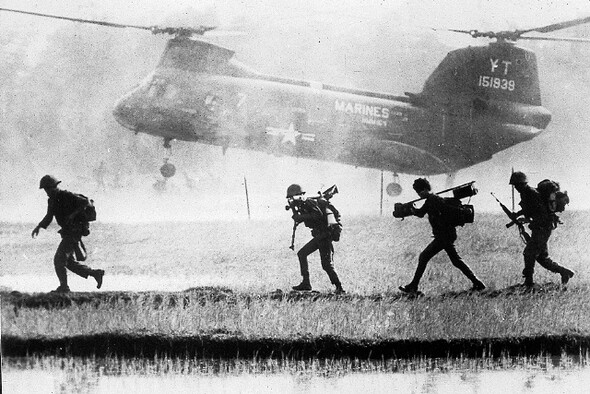hankyoreh
Links to other country sites 다른 나라 사이트 링크
In South Korea, a war over how to remember the Vietnam War

A “war of memory” over the Vietnam War has been raging in South Korea since the turn of the millennium, a recent paper concludes.
The conflict, which traces back to investigative reports by the weekly newsmagazine Hankyoreh 21 and fact-finding campaigns by civic groups in 1999-2000, is pitting the camp of “official memory” against that of “counter-memory”, showing the social reality of ongoing Cold War-era division.
The paper, titled “Transforming and Reconstructing South Korea’s Memories of the Vietnam War,” was published in the spring 2015 edition of the quarterly “Society and History” by historical sociologist Yoon Chung-ro, a senior researcher at the Academy of Korean Studies.
“The current memory battle has transformed into a conflict between the official and counter memories,” explains Yoon.
According to the report, the Hankyoreh 21 campaign, which lasted 46 weeks from Sept. 1999 to Sept. 2000, ignited social interest in experiences and memories of the Vietnam War, while fact-finding campaigns by civic groups formed around the same time marked a turning point in memories of the conflict. Before that time, South Korean memories of the Vietnam War had been “standardized” with the official account characterizing the conflict as a fight against communism and for development, but democratization and the end of the Cold War after 1987 ended the state monopoly on memories of the war, Yoon argues.
The report also notes that the Hankyoreh 21 campaign and fact-finding movement put veterans in the dual position of aggressors and victims, but also had the unintended effect of further entrenching the official memory as veterans protested the human rights- and pacifism-based discourses of Hankyoreh 21 and civic groups. Over time, the veterans’ memories became “resources for political conflict,” spawning diplomatic complexities as the Vietnamese government reacted sensitively to legal amendments and official commemorative events for the Vietnam War under the Lee Myung-bak and Park Geun-hye administrations.
With two competing memories locked in conflict, Seoul found itself in the dilemma of being unable to repudiate the official memory of the war, but also unable to extricate itself from history as long as it maintained its rhetoric characterizing the conflict as having the goals of “guarding freedom” and economic development, the report concludes.
“Veterans and conservatives are working to further entrench the ‘official memory’ of the past, while successors of the Vietnam War Truth Commission like the Peace Museum and civic groups interested in issues of South Korean-Vietnamese history are working to maintain and strengthen memories of resistance,” explains Yoon.
Yoon goes on to predict that “increased awareness of the war rooted in a post-national memory of it, with a focus on the right to live, human rights, and peace, will contribute weakening the social Cold War.”
The message is that the Vietnam War will only be able to live on as a memory within history once South Korea‘s own internal Cold War structure has been dismantled.
By Lee You-jin, staff reporter
Please direct questions or comments to [english@hani.co.kr]

Editorial・opinion
![[Column] Park Geun-hye déjà vu in Yoon Suk-yeol [Column] Park Geun-hye déjà vu in Yoon Suk-yeol](https://flexible.img.hani.co.kr/flexible/normal/500/300/imgdb/original/2024/0424/651713945113788.jpg) [Column] Park Geun-hye déjà vu in Yoon Suk-yeol
[Column] Park Geun-hye déjà vu in Yoon Suk-yeol![[Editorial] New weight of N. Korea’s nuclear threats makes dialogue all the more urgent [Editorial] New weight of N. Korea’s nuclear threats makes dialogue all the more urgent](https://flexible.img.hani.co.kr/flexible/normal/500/300/imgdb/original/2024/0424/7317139454662664.jpg) [Editorial] New weight of N. Korea’s nuclear threats makes dialogue all the more urgent
[Editorial] New weight of N. Korea’s nuclear threats makes dialogue all the more urgent- [Guest essay] The real reason Korea’s new right wants to dub Rhee a founding father
- [Column] ‘Choson’: Is it time we start referring to N. Korea in its own terms?
- [Editorial] Japan’s rewriting of history with Korea has gone too far
- [Column] The president’s questionable capacity for dialogue
- [Column] Are chaebol firms just pizza pies for families to divvy up as they please?
- [Column] Has Korea, too, crossed the Rubicon on China?
- [Correspondent’s column] In Japan’s alliance with US, echoes of its past alliances with UK
- [Editorial] Does Yoon think the Korean public is wrong?
Most viewed articles
- 1‘We must say no’: Seoul defense chief on Korean, USFK involvement in hypothetical Taiwan crisis
- 2‘Weddingflation’ breaks the bank for Korean couples-to-be
- 3[Reportage] On US campuses, student risk arrest as they call for divestment from Israel
- 4[Column] Park Geun-hye déjà vu in Yoon Suk-yeol
- 5Amnesty notes ‘erosion’ of freedom of expression in Korea in annual human rights report
- 6Korea sees more deaths than births for 52nd consecutive month in February
- 7N. Korean delegation’s trip to Iran shows how Pyongyang is leveraging ties with Moscow
- 8Will NewJeans end up collateral damage in internal feud at K-pop juggernaut Hybe?
- 9[Guest essay] The real reason Korea’s new right wants to dub Rhee a founding father
- 10N. Korean hackers breached 10 defense contractors in South for months, police say